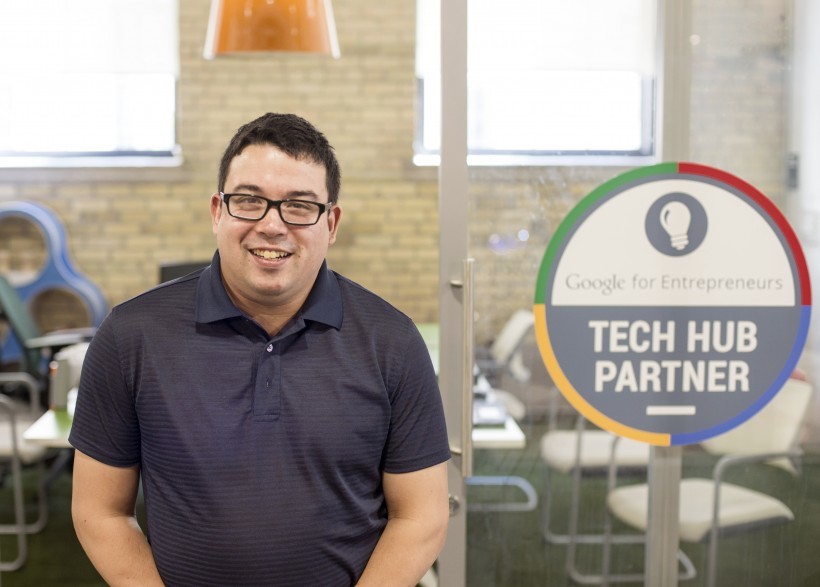How Innovation District Companies Responded to COVID-19 in April
April 9, 2020
By Carol Moreira
Throughout April, Halifax-area companies and institutions intensified their efforts to combat the impacts of COVID-19, both individually and collectively.
The pandemic and lockdown have affected innovation-driven companies in the Halifax area in different ways. Whereas many have suffered a sudden loss of revenues, others have found new markets, some of them lucrative.
Most impressive is how so many companies and other organizations have come together to produce materials and technology needed to help society get through the crisis.
“The level of creativity, innovation, and collaboration between business, academia and government is inspiring,” said Alastair Trower, head of business development at the engineering firm Enginuity.
Enginuity is one of more than 40 businesses and organizations collaborating on personal protection equipment (PPE) and other gear for frontline workers.
The companies were brought together by the Atlantic Canada Opportunities Agency which sought new ways to provide equipment. Designs include facemasks and shields, ventilators, hand sanitizer, inspection booths, and gowns. Already commercially available, the Scotia Shield is a reusable face shield produced by medical device manufacturers Ring Rescue and Spring Loaded Technology.
Scott Moffitt, the Executive Director of life sciences group BioNova is working with the teams to ensure products meet regulatory requirements.
The Pandemic Sparks a Wave of Healthcare Products
April began with Halifax-based Sona Nanotech landing a $4.1 million grant from NGen, the manufacturing supercluster based in Toronto, to produce its rapid-response antigen test for COVID-19. Sona was working on the test with a range of global partners (including GE Healthcare Life Sciences), and now has brought in secured development funding to help bring it to market.
Diagnostic company MedMira announced it has developed a serological test for COVID-19. The test gives an immediate result and can be used with whole blood, plasma or serum in a range of environments, MedMira said in a statement. The new test must gain regulatory approvals before use.
Drug discovery company IMV of Dartmouth is working on a vaccine for the illness. The company expects Phase 1 clinical trials to take place in partnership with the Canadian Center for Vaccinology and the Canadian Immunization Research Network in Nova Scotia and Quebec. They aim to begin testing this summer.
Advances Include Innovations in Food and Senior Care
Outcast Foods partnered with the province’s farms to lessen the food waste caused by the devastation of the food service sector.

“Shortly after the rise of COVID-19 we started receiving calls from farmers that had no buyers for their fresh fruits and vegetables,” said company CEO Darren Burke in a statement.
Outcast, which recently announced a $3 million funding round, dries produce, thus locking in nutrients and extending shelf life. The company will soon construct a processing facility to service the biggest farms in Nova Scotia.
Unfortunately, a venture that makes technology designed to help seniors’ homes protect staff and residents must wait for the pandemic to end to begin work.
Tenera’s technology tracks the locations of people in retirement and nursing homes. Measurements are accurate within six inches, revealing exactly where and with whom people interacted. But the difficulty of ensuring technicians are virus-free means equipment can’t be installed at the moment.

The company’s technology includes a wearable device which links to a system that alerts staff to problems. The technology can also help deal with issues such as pressure ulcers or incontinence.
“Right now, people are in reactive stage because of the situation, but once we get over the hump, I think people will have to be more proactive. Three months from now, we’ll be very, very busy – that’s my expectation,” CEO Stewart Hardie told Entrevestor.
Some IT Companies Find Opportunity in the Crisis
Education technology company Squiggle Park partnered with the Halifax Wanderers Football Club, allowing content from the team’s players to appear on the venture’s Dreamscape platform.
The company sells online games that help children learn to read. The closure of schools increased the demand for eLearning.
“Our revenue grew 400 percent in March,” CEO Julia Rivard told Entrevestor. “We had whole districts calling us and saying, ‘We’re not going back to school tomorrow and we need something to help.’”
Squiggle Park recently gained investment from Halifax’s newest venture capital fund Concrete Ventures. It now has enough money to last until 2021 when it hopes to raise enough to grow from its current 2.5 million to 6 million users.
Fundmetric, a software company that helps charities boost engagement with donors, offered its “giving page” free to small charities. Fundmetric’s clients are generally big charities but the venture wants to help smaller charities switch to digital fundraising.

“With self-isolation and physical distancing being of paramount importance, many charities are faced with the prospect of having to adapt to digital fundraising extremely quickly,” Fundmetric CEO Mark Hobbs said in a statement on the company’s website.
Hobbs said he wants to hire laid-off restaurant workers, partly because of their expertise in customer service.
Automated marketing company SimplyCast of Dartmouth reconfigured its communication software to help organizations coping with the crisis.
In a statement, the company said its software has many applications and can be used in public engagement, emergency management services, disease prevention, and communication with stakeholders.
“SimplyCast has worked hard to create a strong, reliable technology stack that we know and believe can support Covid-19 outbreak containment efforts around the world,” CEO Saeed El-Darahali said in a statement.

Many Innovators Are Enriching the Community During the Lockdown
LeadSift, a maker of software that enables B2B clients to locate sales leads, came to an agreement with venture capital agency Innovacorp to allow Nova Scotian tech startups to use its software free of charge.

Startups can use the software for six months if they are B2B companies selling across North America with outbound marketing.
“As a technology company in the sales intelligence space, there are only a few things we can help other businesses with in this current situation,” said CEO Tukan Das in a statement to startups. “One of them is to provide your business with a daily stream of leads showing interest towards your industry.”
The company is also creating a list of job openings for those in the IT space.
Website developer ImmediaC is helping clients boost online sales. ImmediaC said many clients are now focusing on online sales, bookings, and chat and delivery functions. The company is also reducing costs for non-profits. ImmediaC plans to give 10 percent of this year’s profits to COVID-19 relief.
A new online community called Marketing Mastermind was launched by Katelyn Bourgoin and her CustomerCamp team. The free pop-up community allows marketers and entrepreneurs to explore marketing in the new world created by the pandemic.

Bourgoin told Entrevestor that people have signed up from across the continent. Participants will design an action plan and support each other through a 90-day execution phase.
The Innovation Ecosystem Continues to Develop
The Centre for Ocean Ventures & Entrepreneurship (COVE) and rural tech incubator Ignite signed an MOU intended to grow sector expertise around capture fisheries and aquaculture.
“The relationship with COVE allows for greater communication and partnership between the ocean industry in Nova Scotia and COVE leading to greater commercial opportunities, technology integration and overall growth in the ocean economy,” Doug Jones, CEO of Ignite said in a statement.
It was announced that the first cohort of Lab2Market, the organization that helps researchers create businesses, will be a summertime program run by Dalhousie University and dedicated to healthcare innovation.
Modeled on programs in the U.K. and U.S., Lab2Market works with academics to determine whether their research can be developed into startups. Sixty-five percent of the research at Dalhousie is in healthcare.
Time at Home Creates Opportunity for Some
E-sports platform Swarmio postponed seeking a listing on the TSX Venture Exchange because of the pandemic but found its business thriving due to online gaming and other possibilities.

“Going public is not always the first option. If the new verticals and COVID-19 demand for gaming bring in new revenue, we might not go public. We might stay private and still raise money,” CEO Vijai Karthigesu told Entrevestor.
Swarmio develops remote servers so players of online games can use servers placed at equal distances, so ensuring no player has an advantage. The startup said many people are spending more time gaming.
“It’s an unfortunate situation for the world, but for us it is an opportunity,” the CEO said.
The company is accelerating plans to enter new sectors such as video conferencing.
With Nova Scotia's landmark buildings all empty, Smarter Spaces began creating 3D virtual tours of important sites.
“Now that people can’t physically tour buildings, cultural sites, or educational facilities, our technology can create a 3D virtual experience that’s the next best thing,” CEO Colin Gillis said in a statement.
Startup Funding has Slowed Down, But There’s Still Activity
Adaptiiv Medical Technologies, a venture that improves radiation treatment for cancer patients, closed a fundraising round of $3.4 million, more than twice the company’s goal.
Entrevestor reported that Adaptiiv had raised $7 million and attracted other grants and loans from government agencies.
Adaptiiv 3D prints a bolus made of plastic that is placed over a cancerous area where it accumulates radiation which transfers into the tumour. Customized boluses can be 3-D printed for individual patients.
Adaptiiv sells its system in 14 countries. It has 510(k) regulatory clearance from the U.S. FDA; CE Mark certification from the E.U. and ISO 13485 certification, the global standard for medical technology.
Innovacorp, the venture capital agency backed by the provincial government, announced plans to increase investment.
Managing Director Andrew Ray told Entrevestor the fact governments are involved in VC funding in Atlantic Canada will help strong local companies survive.
“We think investing through the crisis will provide a return to us, but we also think it will be good for our companies,” Ray said. “They will be able to beat out the competition.”
Innovacorp can make investments of up to $2 million. Ray said around 70 percent of Innovacorp’s 39-company portfolio will survive the pandemic. The group will make 12 to 15 investments this year and around half will be in new ventures.
National news hub Betakit reported that BDC Capital is offering its Capital Bridge Financing Program, allowing it to match, with a convertible note, a financing round being raised through qualified existing and/or new investors.
Venture capital fund Concrete Ventures announced it has invested in eight tech startups during its first year in operation.
The $18 million early-stage investment fund is supported by the Nova Scotia government and tech investors. Known investments include such Halifax-area companies as SalesRight; Motryx, Proof, Talkatoo, and Squiggle Park, as well as Sydney-based Securicy and St. John’s-based Rally. The portfolio companies have raised more than $6 million, about one-third of which came from outside Atlantic Canada.

Carol Moreira is a Principal of Entrevestor, which provides news and data on Atlantic Canadian startups.